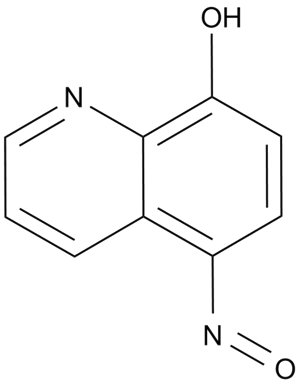NSC 3852 |
| Catalog No.GC15040 |
A tumor cell differentiating agent
Products are for research use only. Not for human use. We do not sell to patients.

Cas No.: 3565-26-2
Sample solution is provided at 25 µL, 10mM.
NSC 3852 is a potent inhibitor of histone deacetylase [1].
Histone deacetylases (HADC) are a series of enzymes that remove acetyl groups from an ε-N-acetyl lysine amino acid on a histone and make the histones to wrap the DNA more tightly, which prevent transcription.
In MCF-7 human breast cancer cells, NSC 3852 induced the formation of the DMPO-OH adduct, which was catalyzed by superoxide dismutase. The result suggested that NSC 3852 induced generation of superoxide and reactive oxygen species (ROS), which produced DNA damage and induced apoptosis. Also, NSC 3852 resulted in cells accumulation in G0, hypophosphorylated retinoblastoma protein(Rb) and reduced E2F1 and Myc protein [1]. In HS68 cell, NSC 3852 inhibited Toxoplasma gondii tachyzoite propagation with EC50 value of 78.6 nM. Also, in human red blood cells, NSC 3852 inhibited Plasmodium falciparum growth with EC50 value of 1.3 μM. NSC 3852 inhibited Toxoplasma gondii tachyzoite propagation by involving redox reactions [2].
References:
[1]. Martirosyan A, Leonard S, Shi X, et al. Actions of a histone deacetylase inhibitor NSC3852 (5-nitroso-8-quinolinol) link reactive oxygen species to cell differentiation and apoptosis in MCF-7 human mammary tumor cells. J Pharmacol Exp Ther, 2006, 317(2): 546-552.
[2]. Strobl JS, Seibert CW, Li Y, et al. Inhibition of Toxoplasma gondii and Plasmodium falciparum infections in vitro by NSC3852, a redox active antiproliferative and tumor cell differentiation agent. J Parasitol, 2009, 95(1): 215-223.
Average Rating: 5 (Based on Reviews and 30 reference(s) in Google Scholar.)
GLPBIO products are for RESEARCH USE ONLY. Please make sure your review or question is research based.
Required fields are marked with *




















